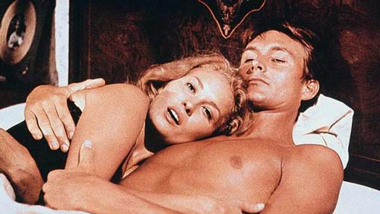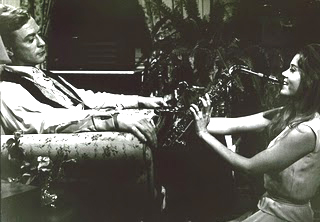
 |
|
|
|
One of the most critically jeered movies of the sixties, Otto Preminger's Hurry Sundown is a relentlessly overcooked melodrama about the Evil South, written in terms so broad that a Black Panther would object to its negative image of Southern whites. This epic tale of racial injustice would make an excellent co-feature for Arthur Penn's The Chase, another movie that pictures the South as a hostile Alien planet. That's not saying that the conditions or attitudes pictured in the two movies didn't exist, it's just that the issue is poorly served by scenarios more interested in sex, violence and sensation. Otto Preminger had reached a high point in his career with a series of epic multi-character dramas about the legal system (Anatomy of a Murder), the government (Advise and Consent) and the Navy in WW2 (In Harm's Way). An outspoken supporter of Civil Rights from the early 1950s, Preminger would seem a good choice for a show about greed and lust across the racial divide in the New South. It didn't work out that way. Along with several other underperforming Otto Preminger movies, Olive Films finally allows us to judge Hurry Sundown for itself, in a good DVD edition. Otto made news by filming his Georgia-set story in the South, even after Governor Wallace refused to allow Hurry Sundown to be shot in his state. The picture has an impressive cast of Preminger regulars, plus some wild card casting that keeps us from investing in the characters. At any rate, the otherwise handsomely filmed movie never gets beyond its own tricked-up, numbingly artificial storyline. As in The Chase, what might have been a powerful statement about race relations in a rigged social system comes off as forced and phony. And quite a hoot to watch. Ambitious Georgia developer Henry Warren (Michael Caine) must finalize the purchase of two farm properties to wrap up a huge land deal. But his heavy handed tactics cause the two farmers, one black and one white, to forget their differences and unite against him. Rad McDowell (John Phillip Law) is a Warren relative just back from fighting in Europe. He has a loving wife in Lou (Faye Dunaway) and a fourteen year-old son Charles (Steve Sanders) who hates being stuck on their miserable few acres. Next door live Reeve Scott and his sickly mother Rose (Robert Hooks & Beah Richards). Rose was once a servant in the home of Henry Warren's society-minded wife Julie Ann (Jane Fonda), and Henry thinks that getting her to sell her land cheaply will be a cakewalk. 
A complex knot of jealousies and hatreds works its way into the picture. Julie Ann's cousin, the new minister, allows blacks to attend the church services. This gesture makes a bitter enemy of the unreasonable Judge Purcell (Burgess Meredith), a leading exponent of the local racist system known as "how we do things down here". But when the Judge breaks with the influential Warrens, his wife Eula and daughter Sukie (Madeleine Sherwood & Donna Danton) throw conniption fits -- none of the "quality people" are returning RSVPs to Sukie's upcoming wedding. Teacher Vivian Thurlow (Diahann Carroll) would like to marry Reeve Scott, but he's convinced that an educated woman like Vivian would never be happy stuck on a poor farm. Meanwhile, Henry and Julie's sex life is a disaster area. Their lovemaking sessions are interrupted by the screams of their young son, who has been emotionally traumatized by an incident of child neglect for which Henry was responsible. Henry becomes easy prey for the voracious Sukie, who wants to make it with him one more time before she is married. The need to secure the land quickly forces Henry to take rash action -- Julie Ann tries to pressure Rose Scott into acknowledging that she doesn't really own her acreage. Unable to turn Reeve Scott and Rad McDowell against each other, Henry takes the ownership issue to Judge Purcell's crooked court, and enlists the deputies of Sheriff Coombs (George Kennedy), all of whom are Klansmen, to put pressure on Rad. Faster than you can say, "There's a heap of mendacity going on here", the county becomes a powder keg of frustrated sex, crooked deals and naked bigotry. Just what makes Hurry Sundown so tasteless, ill conceived and wrong-headed? I'd say that the problem is a toxic blend of well-intentioned liberalism and cornball soap opera plotting. The story wants to expose the South's unenlightened racial attitudes. It muffs the job in the usual way, by making its black characters into noble saints and model citizens, while the bad whites are either outrageous monsters or venal, bigoted boors. In the movie's view, the only good that can come from this mess is when disadvantaged blacks and whites (Reeve & Rad) join together to start a new and equal society. Other "author's messages" include the assertion that blacks can't depend on whitey for anything any more, and must demand their rights on their own. The movie claims the right to make heavy use of the "n" word (and all of its variations), in the name of liberal righteousness. It instead becomes a teaching aid for viewers not familiar with the many disparaging substitutes for the 'n' word. Whenever it tries to tackle a serious social-problem story in the form of a big commercial movie that has to make use of movie stars, Hollywood tends to get into a bind. Hurry Sundown might have been an obscure masterpiece had it been cast with unknowns that had a chance of being mistaken for real people. Instead we get the spectacle of cockney Michael Caine pretending to be an upstart businessman in the postwar South. There's nothing at all wrong with Caine's acting, but whenever the dialogue heats up his accent breaks through. Jane Fonda is also pretty good considering that her Julie Ann is a stack of contradictory impulses -- oversexed wife, aristocratic Southern Belle, distraught mother of a disturbed child. Julie Ann defends the right of blacks to join a traditionally white congregation (if only in the back pews) but betrays her connection to her "mama" Rose as soon as property is involved. Jamming all of these contrary angles into one modern Scarlett O'Hara clone makes for a lot of thematic confusion. The black actors play their roles in a theatrical manner guaranteed to antagonize black audiences. Mama Rose and Professor Thurlow (iconic legend Rex Ingram) seem straight from a revival of Uncle Tom's Cabin. Robert Hooks is a pillar of masculine strength, resisting provocations from every direction, far too good to be true. Diahann Carroll seems to have strolled right out of a Sidney Poitier movie -- she's pert, thoroughly modern and blissfully willing to charm her way past Burgess Meredith's clownish Judge. Other blacks are hardly present except to be shown making a fool out of George Kennedy's idiotic sheriff, or marching together as a faceless unit. Although this is supposed to be 1946, both Carroll and Jane Fonda's dress and hairstyles are pure 1966, throwing any notion of realism out the window. When Fonda shows up in the very first scene we think that it is supposed to be 1966. She even meets a giant Sikorsky helicopter that seems slightly anachronistic for 1946, a model not really seen much until the Korean War (I stand ready to be corrected on this). Then-hot actor John Phillip Law looks great but is colorless as Rad McDowell; he doesn't convey the attitude of a veteran or seem weather-beaten enough to have spent 25 years working the Georgia soil. Law especially has no chemistry with Faye Dunaway, who appears to be holding back to avoid overpowering her co-player. The glamorous Dunaway looks exactly like what she is, a show-biz beauty given a ratty hairstyle and a print dress, and told to act "poor". The rest of the players are cast to type and deliver good performances in unsurprising roles. Madeleine Sherwood throws an amusing hissy fit at her husband, the Judge, but still seems just another variation on the Southern monsters she played in earlier pictures. Burgess Meredith seems to relish dishing out the 'n' word at every opportunity, and his crooked judge is almost a parody, a couple of clicks away from Judge Roy Bean. The subject matter of Hurry Sundown is a tough nut to crack, but Otto Preminger seems clueless on how to handle it with anything resembling good taste. 
Speaking of good taste, Hurry Sundown has a couple of truly provocative moments. Ten years earlier, the Production Code censors looked with suspicion on scenes of singers holding microphones too suggestively. Preminger shows what looks suspiciously like 'alternative' sex between Donna Danton and Michael Caine in a parked car. Even more precocious is a scene where Jane Fonda takes Caine's saxophone away from him and proceeds to mime very specific motions on its mouthpiece. I can just see Jack Valenti seeing this scene and saying, "Sheesh! Okay okay, it's time for a ratings system already." 1 I don't know how the book resolved all of these thorny issues, but Preminger's "explosive" movie repeatedly falls back on dynamite explosions to punctuate its dramatic climaxes. Symbols fly left and right as the film wastes time on subplots involving the contrasting sons of Henry and Rad. After sitting through Hurry Sundown's 2.5 hours of unintentionally campy, miscalculated melodrama, Arthur Penn's strained politics in The Chase seem relatively benign! Olive Films' DVD of Hurry Sundown is a very good enhanced transfer of the kind of film that seldom gets a normal home video release. The opportunity to see a picture that got so much negative attention when new is a treat in itself. The audio is good as well, and Hugo Montenegro's overlooked music score is one of the film's definite assets. No subtitle options are present -- hearing-impaired film fans have been given the short end of the stick now that a majority of DVD releases no longer offer English subtitles. Olive Films has also released Preminger's Such Good Friends and has promised that a street date for the director's notorious oddball musical Skiddoo! will soon be announced.
On a scale of Excellent, Good, Fair, and Poor,
Hurry Sundown rates:
Footnote:
1. Another MPAA jaw-dropper -- right in the middle of a hospital, during a crucial domestic argument over a crooked court case, a brain-damaged son and a pending divorce, Michael Caine's Henry chooses to "influence" Jane Fonda's rebellious Julie Ann by pinning her to a wall, shoving his hand into her dress and squeezing one of her breasts. I remember seeing this insane moment immortalized in a still reprinted in Playboy magazine..
Reviews on the Savant main site have additional credits information and are often updated and annotated with reader input and graphics. Also, don't forget the 2010 Savant Wish List. T'was Ever Thus.
Review Staff | About DVD Talk | Newsletter Subscribe | Join DVD Talk Forum |
| ||||||||||||||||||